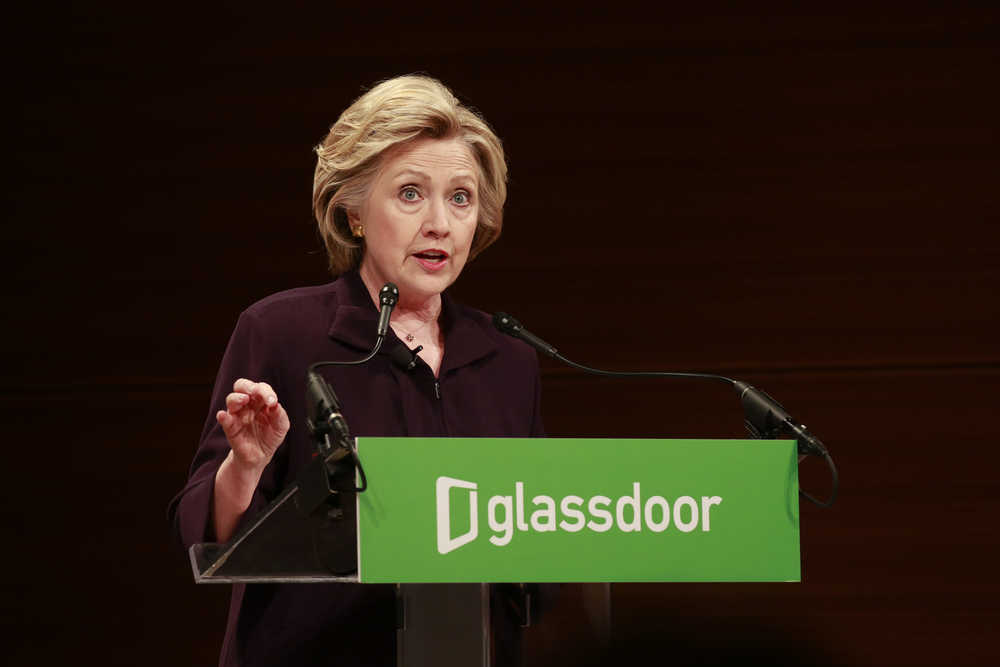ROCHESTER, N.Y. — When he launched his longshot presidential bid last year, Bernie Sanders often said he liked Hillary Clinton but disagreed with her on issues. A year later, the Democratic primary candidate and his supporters seem to be finding a lot less to like.
At packed arenas, Sanders devotes a significant portion of his campaign speeches to his policy differences with Clinton — a list that includes her support from super PACs, her speeches on Wall Street and ties to fracking. Clinton’s campaign complains it’s tantamount to a character attack.
His surrogates sometimes go farther: “Shame on you, Hillary,” actress Rosario Dawson said last month at a large Sanders rally in the Bronx. The crowd booed the mention of Clinton’s name, a reaction now happening frequently at Sanders rallies.
Across the country, Sanders’ supporters are pressuring Clinton superdelegates to shift their loyalties to the Vermont senator, particularly in states where Sanders has won. And Clinton’s backers say the exchanges have taken a nasty tone on Facebook and Twitter and in local races where loyalties between the two sides are well-defined.
“There are some Sanders’ supporters who have not been respectful because their main concern is Senator Sanders,” said Jason Morgan, a Clinton backer who is running for a county commission seat in Ann Arbor, Michigan. “My platform has nothing to do with Hillary Clinton or Bernie Sanders — because I’m running for local office.”
With a pledged delegate lead of more than 250, Clinton remains the favorite to capture the party’s nomination. But Sanders’ strong showing, particularly among young voters, underscores the difficulties she may face unifying her party around her bid. At least 17 percent of Democrats said they would not back Clinton in a general election, according to a recent AP-GfK poll.
As he has gained ground against Clinton, Sanders has cast his campaign as a pitched battle against establishment politics.
He often paints her as a candidate who has been late to embrace too many issues, including raising the minimum wage to $15 and fighting the natural gas extraction process known as hydraulic fracturing.
During his Tuesday rally in Rochester, Sanders invoked Clinton’s name six times during a 9-minute stretch of his speech. Clinton, he told the crowd, had established several super PACs funded by special interests and Wall Street and still refuses to release the transcripts of her lucrative speeches to Wall Street banks.
“Does anybody seriously believe that you can be an agent of change if you are taking money from the most powerful special interests?” Sanders asked.
That anti-establishment message is fueling efforts by liberal groups supporting his bid like Moveon.org to urge Clinton superdelegates to flip their support. The Democratic party officials who can back either candidate overwhelmingly support Clinton by a margin of 469-31 according to an AP count.
Some superdelegates report being flooded with calls and threatening messages at their homes and offices. Isabel Framer, a judicial interpreter and DNC member from Ohio, said she received a threatening message at her office several weeks ago, calling her support for Clinton “crap.”
“After that message, the phone kept ringing,” Framer said. “It was just non-stop.”
Tad Devine, a senior Sanders adviser, said the campaign has not encouraged its supporters to take any aggressive tactics in promoting the senator. “We want people to be courteous and respectful in dealing with anyone,” Devine said. “We encourage people to support Bernie and tell others why they are supporting Bernie but we want them to do it in a positive and constructive way.”
Clinton, too, has escalated her attacks on Sanders. Campaigning in New York City on Monday, she questioned his foreign policy credentials, support for immigration reform and likened his record on gun control to that of the National Rifle Association. She has also suggested Sanders’ supporters have crossed a line.
“There seems to be a growing level of anxiety in that campaign which I hope doesn’t spill over into the way that his supporters treat other people who have every right to support whomever they chose,” she told reporters after a campaign stop in Queens.
Clinton’s supporters place the blame for the more aggressive tone squarely on Sanders.
Last week, Bob Mulholland, a longtime member of the Democratic National Committee and Clinton superdelegate, penned an open letter asking Sanders and his staff to publicly call for a stop of “harassing communications of DNC members.”
At his rallies, Sanders questions Clinton’s past support for trade deals and reminds his audiences that Clinton voted to authorize the Iraq war in 2002 while he opposed it. “Her judgment was faulty,” he said.
In New York, where Gov. Andrew Cuomo banned fracking in 2014, Sanders portrays Clinton as working in unison with oil and gas companies to push fracking around the globe while she served as President Barack Obama’s secretary of state.
The tone underscores Clinton’s task in unifying Sanders’ supporters if she wins the nomination.
Oscar Salazar, a 20-year-old New York college student who attended several Sanders’ rallies, said he once considered backing Clinton if she’s the nominee but now plans to write in Sanders’ name instead.
“The system’s rigged for Hillary Clinton,” Salazar said. “I want to send a powerful message for all young voters — we’re not going to vote for her.”
__
Follow Ken Thomas and Lisa Lerer on Twitter at: https://twitter.com/KThomasDC and https://twitter.com/llerer

